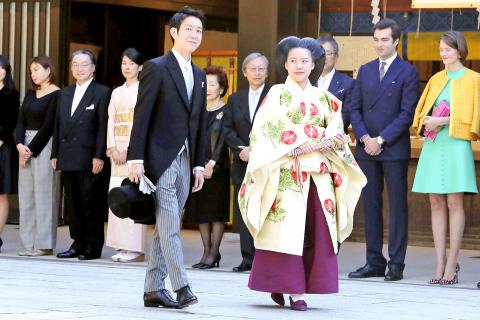Japanese Princess Ayako yesterday married a commoner in a ritual-filled ceremony at Tokyo’s Meiji Shrine.
Ayako and groom Kei Moriya were shown on national news walking in a stately procession before guests at the shrine. The wedding took place in one of the pagoda-like buildings in the shrine complex, and included an exchange of rings and a sharing of a cup of sake, according to Japanese media.
Both rituals are relatively routine for Shinto-style weddings, including those of regular Japanese.

Photo: Kyodo News via AP
Ayako, 28, is the daughter of the emperor’s cousin, and Moriya, 32, works for major shipping company Nippon Yusen.
She wore a Heian-era style hairdo, which is swept back into a ponytail, and a traditional robe splashed with red and green patterns, while Moriya wore coattails. She later changed into a red Japanese robe.
“I am filled with happiness,” she told reporters after the ceremony.
Women who marry into the imperial family become members of the family, but those who marry commoners, like Ayako, must leave the family.
Moriya said that he hoped to help Ayako adjust to a commoner’s life.
“I want us to work together, hand in hand, to create a family filled with smiles,” he said.
Ayako last week bid farewell to Japanese Emperor Akihito.
She yesterday said that she hoped to continue to help the emperor and empress as a former member of the Japanese imperial family.
The eldest granddaughter of the emperor is set to marry a commoner in 2020.
Akihito has said that he would abdicate next year. His eldest son, Japanese Crown Prince Naruhito, is to ascend to the Chrysanthemum Throne on May 1.
When they announced their wedding plans, Ayako and Moriya said they met because their mothers were friends and hit it off immediately.
“It didn’t feel as though we had met for the first time,” Ayako told reporters at their engagement.
Moriya said he had been attracted to her gentle spirit, adding: “And I knew I wanted to spend the rest of my life with her,” he said.
Ayako’s father, Japanese Prince Takamado, who was active in supporting Japanese soccer, died in 2002.

IDENTITY: A sex extortion scandal involving Thai monks has deeply shaken public trust in the clergy, with 11 monks implicated in financial misconduct Reverence for the saffron-robed Buddhist monkhood is deeply woven into Thai society, but a sex extortion scandal has besmirched the clergy and left the devout questioning their faith. Thai police this week arrested a woman accused of bedding at least 11 monks in breach of their vows of celibacy, before blackmailing them with thousands of secretly taken photos of their trysts. The monks are said to have paid nearly US$12 million, funneled out of their monasteries, funded by donations from laypeople hoping to increase their merit and prospects for reincarnation. The scandal provoked outrage over hypocrisy in the monkhood, concern that their status

The United States Federal Communications Commission said on Wednesday it plans to adopt rules to bar companies from connecting undersea submarine communication cables to the US that include Chinese technology or equipment. “We have seen submarine cable infrastructure threatened in recent years by foreign adversaries, like China,” FCC Chair Brendan Carr said in a statement. “We are therefore taking action here to guard our submarine cables against foreign adversary ownership, and access as well as cyber and physical threats.” The United States has for years expressed concerns about China’s role in handling network traffic and the potential for espionage. The U.S. has

A disillusioned Japanese electorate feeling the economic pinch goes to the polls today, as a right-wing party promoting a “Japanese first” agenda gains popularity, with fears over foreigners becoming a major election issue. Birthed on YouTube during the COVID-19 pandemic, spreading conspiracy theories about vaccinations and a cabal of global elites, the Sanseito Party has widened its appeal ahead of today’s upper house vote — railing against immigration and dragging rhetoric that was once confined to Japan’s political fringes into the mainstream. Polls show the party might only secure 10 to 15 of the 125 seats up for grabs, but it is

The US Department of Education on Tuesday said it opened a foreign funding investigation into the University of Michigan (UM) while alleging it found “inaccurate and incomplete disclosures” in a review of the university’s foreign reports, after two Chinese scientists linked to the school were separately charged with smuggling biological materials into the US. As part of the investigation, the department asked the university to share, within 30 days, tax records related to foreign funding, a list of foreign gifts, grants and contracts with any foreign source, and other documents, the department said in a statement and in a letter to